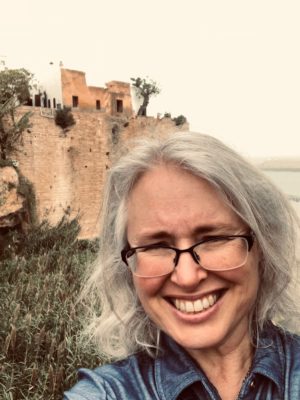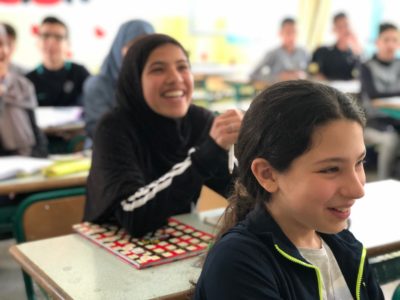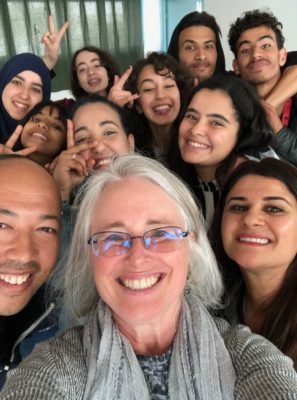Last September, I wrote a blog as I was just starting a 10-week course with the Fulbright Teachers for Global Classrooms program. As I wrote that blog, I was just learning about global competencies for myself and my students. It has been eight months since then, and it feels like a lifetime. I’m not the same teacher I was at the beginning of the year. I’m better.

Rabat, Morocco
Let me explain how it happened. In December, after my 10-week course, I was assigned to a cohort destined for Morocco. It was stressful finding out that I was in the cohort scheduled to leave the earliest, as they are spread out over the spring and summer months, with Morocco being the first of the five cohorts to go. We had just over two months to prepare to be out of our classrooms for three weeks.
In February the Fulbright TGC fellows attended a symposium in Washington D.C. where we learned more about global education and met teachers from Morocco and other host countries. We had security briefings and cultural trainings in preparation for our trips. I met with my cohort face-to-face, while other cohorts for other destinations (Peru, Indonesia, Senegal, Columbia, and India) met to learn the specifics of their journeys. It was exciting and overwhelming, especially since there were only two weeks between the symposium and our departure!
During the time between the symposium and my trip, I frantically scrambled to prepare my classes for my absence and myself for this otherworldly experience. I began a dialogue via WhatsApp with my amazing host teacher, Rachid El Machehouri, an English teacher in Tangier. As he built an agenda around my interests, it became exciting and real. I was on my way to Africa to visit teachers and students.

Junior high students, Tangier
And so it was that for three weeks in March I traveled to Morocco with my Fulbright TGC cohort. The experience was life changing. Any trip abroad, especially for a fairly inexperienced traveler, can feel like the whole world is finally opening up to you. But, this was more. I got to experience classrooms and teaching in another country.
In my first blog about Global Ed, I introduced elements from ASCD’s Global Competent Learning Continuum, a rubric that measures a teacher’s global competencies. You can explore the full continuum here.
Now I would like to connect these ideas to the new teacher I am becoming. Likewise, if you are a teacher with the opportunity to bring the world into your classroom, either virtually or through your own travel experiences, I commend you. Your students are definitely better for it. Measure yourself by the same rubric. We all have room to grow.
Teacher Dispositions
1. Empathy and valuing multiple perspectives
2. Commitment to promoting equity worldwide
FEELING: I felt that I was strong in teacher dispositions from the start, but I have a whole new metric now. What can top the experience of being in a room full of Muslim students on the day of a massacre in a New Zealand mosque? Do you think I had the chance to value a different perspective from my own? When those students showed me compassion as the outsider, how did that impact my own idea of empathy? My commitment to teaching compassion and promoting equity grew tenfold.
Teacher Knowledge
3. Understanding of global conditions and current events
4. Understanding of the ways that the world is interconnected
5. Experiential understanding of multiple cultures
6. Understanding of intercultural communication
KNOWING: With travel and the learning that accompanies it, a teacher’s knowledge cannot help but grow. I learned so much about North Africa, about Muslims, and about Moroccan people. I learned about how we are all essentially alike, despite our differences. I witnessed the way a multilingual culture gracefully moves between languages, valuing linguistic diversity and encouraging communication of all types. Moroccans openly communicate verbally and nonverbally. They don’t shut out strangers. It is shocking and illuminating, as it contrasts so starkly with how Americans are often cut off from others.
Teacher Skills
7. Communicate in multiple languages
8. Create a classroom environment that values diversity and global engagement
9. Integrate learning experiences for students that promote content-aligned explorations of the world
10. Facilitate intercultural and international conversations that promote active listening, critical thinking, and perspective recognition
11. Develop local, national, or international partnerships that provide real world contexts for global learning opportunities
12. Develop and use appropriate methods of inquiry to assess students’ global competence development
DOING: I began adding global competencies to my teaching in the fall, but things have escalated since my time in Morocco. First and foremost, the existing cultures in my classroom are valued and emphasized. We do not pretend to be all one homogenous culture. We talk openly about how things are different in our families and with our cultural backgrounds. Whether it is food or traditions or specific idioms, we are discussing them and relating them to the lessons we are learning in class.

Host teacher Rachid El Machehouri, me, and an amazing drama class in Tangier
In my classroom I am openly valuing diversity of languages. My Spanish-speaking students feel free to use their home language and challenge me to understand and communicate with them. They teach me words and we discuss cognates, and we are learning basic French together. I have had English language learners in class for many years, but I rarely heard other languages spoken in my English class. It was as if speaking one’s home language was secretly forbidden and even embarrassing. Now, we celebrate languages and call out their similarities and differences- because similarities and differences are what makes life interesting! I cannot stress enough how this has changed our classroom culture. It has brought such joy!
Now, every lesson has a global context, and learning opportunities arise every day where I can make a global connection. For instance, I teach Animal Farm to freshmen in the spring, and this year they got a true global view of capitalism, communism, socialism, and the fallout of WWII. All such history is worldwide and inclusive. Where we are now and who we are now has its roots in those other places and times. It’s powerful when you take a lesson to it’s global extension!
Plus, students have unanswered questions, and now I am a resource. I have randomly explained prayer rugs, Ramadan, halal foods, and Mecca just this week. This wasn’t part of the curriculum, but young enquiring minds wanted to know. And, although I am no expert, I have pointed them toward understanding without judgment. And the world needs a lot more of that.
My journey has truly just begun. I can only hope that other teachers can embrace global education. Global competencies address so many of the issues we teachers face: social emotional learning, critical thinking, collaboration, creativity, civics, career and technical education, the arts… It’s a whole world of learning.
For more details of my adventures in Morocco, you will find stories accumulating on my personal blog, Create to Learn. Please consider sharing your own global education experiences.